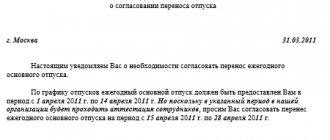When can an employee take leave without pay?
An employer cannot ask an employee to take leave without pay, and an employee can take such leave at will. Typically, leave is taken for a good reason: family matters, the birth of a child, a wedding, the death of a loved one. Moreover, an employee can ask for leave at his own expense without a valid reason for any period. The law does not establish a list of valid reasons, and the employer himself decides whether to let the employee go.
This issue requires correct negotiations between the parties. If an employee absolutely needs a vacation, he may resign, and the company will lose the employee. It may be better to agree on vacation dates rather than cause conflict. To avoid unfavorable situations, the employer should consider the issue of such leaves in advance and establish the rules in the company’s local regulations. There he can limit the duration of vacations and introduce other conditions.
Legislative regulation
The relationship between the two main subjects of labor law - the employee and the employer - is regulated by the Labor Code of the Russian Federation. It is this document that contains the answers to all the questions these individuals have.
Providing employees with vacations at their expense, that is, without saving their salaries, is regulated by Art. 128 of the Labor Code of the Russian Federation, as well as its other articles and other laws. This issue can be regulated, among other things, by a collective agreement concluded in the organization.
When you cannot refuse an employee leave
There are categories of employees who cannot be denied leave without pay:
- WWII participants;
- working disabled people;
- old age pensioners;
- parents and spouses of civil service employees and military personnel who died in service;
- Heroes of Labor and full holders of the Order of Labor Glory;
- candidates' proxies in connection with elections;
- at the birth of a child, death of a relative, marriage registration;
- part-time workers - they are entitled to leave at their own expense simultaneously with leave from their main job, if there are fewer days of part-time leave;
- military spouses if their paid leave is shorter than their spouse's leave;
- working students of universities and colleges;
- applicants to universities (15 days) and secondary educational institutions (10 days).
A single parent of a child under 14 years of age, a parent of two or more children under 14 years of age, a parent of a disabled child under 18 years of age also has the right to permanent leave without pay, but this must be enshrined in the company’s local regulations or a collective agreement.
Keep records of exports and imports in the Kontur.Accounting web service. Simple accounting, payroll and reporting in one service
Deviations from the vacation schedule
According to Art. 123 of the Labor Code of the Russian Federation, the priority for granting paid vacations is determined annually in accordance with the vacation schedule approved by the employer, taking into account the opinion of the elected body of the primary trade union organization no later than two weeks before the start of the calendar year in the manner established by Art. 372 of the Labor Code of the Russian Federation for the adoption of local regulations.
The vacation schedule is mandatory for both the employer and the employee. However, deviations from the schedule are still possible.
First, let's talk about cases where the law requires changing the employee's planned rest date. In particular, by virtue of Art. 124 of the Labor Code of the Russian Federation, annual paid leave must be transferred to another period determined by the employer taking into account the wishes of the employee in the following cases:
- temporary disability of the employee (for example, vacation is planned from 12/01/2015 to 12/29/2015. The employee was notified of the start of the vacation on 11/13/2015, an order was issued to grant vacation, vacation pay was paid on time. On 11/30/2015, the employee fell ill and contacted the employer with an application for transferring vacation. In such a situation, the employer cannot refuse the employee and is obliged to satisfy his request - cancel the order to grant vacation and take into account the employee’s opinion when granting vacation on other dates);
- the employee performs state duties during his annual paid leave, if the labor legislation provides for exemption from work for this purpose;
- in other cases provided for by labor legislation and local regulations.
This is also important to know:
Paternity leave for fathers
If the employee was not promptly paid for the time of annual paid leave or the employee was warned about the start time of this leave later than two weeks before its start, then the employer, upon a written application from the employee, is also obliged to postpone the annual paid leave to another date agreed with the employee.
note
Even with the mandatory transfer of vacation, new vacation dates are determined in some cases by the employer independently, only taking into account the wishes of the employee, but not following them, and in other cases - by the employee.
Given the above reasons, employees often believe that they can go on vacation when they need to, and are completely confident that the employer does not have the right to prohibit them from doing so. Thus, the Khabarovsk Regional Court considered a dispute regarding the application of disciplinary measures to an employee who went on leave without permission after his part was transferred. The Appeal Determination dated September 12, 2014 in case No. 33-5797 states that the employer tried many times to find out the plaintiff’s opinion about the deadline for rescheduling vacation (the vacation was postponed due to temporary disability during the period provided for by the schedule), but the plaintiff unilaterally determined for himself the start date of the vacation and departed for it, which contradicts Part 1 of Art. 124 Labor Code of the Russian Federation.
In addition, employees can return to work on the day their vacation begins. These actions can also be considered a violation of labor discipline, which is confirmed in judicial practice. So, on the day established by the vacation schedule (07/18/2013), the employee went to work and submitted a corresponding application to the employer. The court indicated that unilateral actions by employees to postpone the date of vacation are unacceptable (Appeal ruling of the Supreme Court of the Chuvash Republic dated May 22, 2015 in case No. 33-1663/2015).
However, not only for the reasons mentioned in Art. 124 of the Labor Code of the Russian Federation, you may need to change the start or end date of the vacation. For example, an employee has certain circumstances and needs leave at a time other than planned. In this case, he contacts the employer with a statement in which he asks to change the period of rest.
How are issues regarding vacation resolved between an employee and an employer?
The parties need to agree on leave and formalize it: the employee writes a statement, the employer issues an order in which the employee signs. To be convincing, the employee should bring documents that confirm the seriousness of the reason why leave is required. An employer can rely on the organization’s local regulations if they stipulate the conditions for unpaid leave. Correctness is important, since an employee can go to court to protect his rights, and the company may face fines for violations with vacations.
If an employee goes on vacation without the consent of the employer, he can fire him for absenteeism. But if it turns out that the employee could not have been refused, he can be reinstated in his position through the court.
If the employer wants to recall an employee from vacation, this is also resolved through negotiations; the employee returns voluntarily or refuses to interrupt the vacation without any consequences for himself.
If an employee changes his mind about taking a vacation and wants to leave unpaid leave early, this can be done. You need to contact the employer, discuss this and write an application for early termination of vacation.
If there is downtime at a company, the employee cannot be sent on vacation at his own expense, this would be a violation of the law. During the period of downtime, the employee is entitled to a salary in the amount of ⅔ of the usual salary or rate.
Registration procedure
Vacation is guaranteed to be provided to all team members, regardless of their position and status, and the same rules apply to everyone.
You can arrange it using the following algorithm:
- write and submit a handwritten application indicating the start and end dates of the vacation;
- attach supporting documents;
- send an application to the manager in person or by mail;
- wait for the result.
If the application is granted, the employer issues a corresponding order no later than the date from which the free leave countdown will begin. Based on it, the corresponding notes will be made in the employee record sheet.
But if an employee receives a refusal, then he cannot leave the workplace of his own free will. His action will be regarded as truancy, and he will be subject to:
- disciplinary action;
- dismissal.
At the initiative of the applicant, it is possible to return to the workplace earlier than the specified date, of which the citizen must notify the head of the company in writing.
Attention: The boss does not have the right to call employees from vacation without their personal consent (Article 125 of the Labor Code of the Russian Federation).
It is strictly forbidden to interrupt vacation for the following categories of citizens:
- minor workers;
- pregnant women;
- employees working in hazardous conditions.
It is illegal for a boss to interrupt vacation days.
How many days of vacation at his own expense is an employee entitled to?
The number of days is indicated in the Labor Code of the Russian Federation only for those categories of workers who cannot be denied leave.
- WWII participants - up to 35 days a year;
- for old-age pensioners - up to 14 days;
- parents and spouses of deceased military personnel - up to 14 days;
- disabled people - up to 60 days;
- war invalids - up to 120 days;
- for employees due to a wedding, birth of a child, death of a loved one - up to 5 days;
- for students and applicants of universities - from 15 to 120 days, secondary educational institutions - from 10 to 60 days;
- employees - up to a year.
If an employee has not used the required vacation days at his own expense during the year, they cannot be transferred to the next year.
With other employees, the issue is resolved through a personal agreement with management. Also, the period of leave without pay can be specified in the local regulations of the company or the collective agreement, then it will not be possible to take more days of leave per year.
Keep records of exports and imports in the Kontur.Accounting web service. Simple accounting, payroll and reporting in one service
The employee did not warn his superiors about the use of rest in connection with blood donation
After each day of donating blood and its components, the employee is given an additional day of rest (Part 4 of Article 186 of the Labor Code of the Russian Federation). The specified day of rest, at the request of the employee, can be added to the annual paid leave or used at other times within a year after the day of donation of blood and its components.
Thus, after the day of donating blood, the employee, based on the relevant certificate, has the right to ask the employer to provide a day of rest. And he cannot refuse him. If the employer refuses and the employee does not go to work on the day when he planned to get a day of rest, then such absence cannot be regarded as absenteeism.
In paragraph 39 of Resolution No. 2 of the Plenum of the Armed Forces of the Russian Federation, Fr.
But sometimes workers, knowing that they are entitled to a day of rest for donating blood, forget that they should notify the employer in advance about their absence from work, or deliberately do not do so.
In this regard, it is worth remembering that Resolution No. 2 of the Supreme Court of the Russian Federation states that the use of a day of rest, which the employer unlawfully refused to provide, cannot be regarded as absenteeism. But if the employee did not ask the employer to provide a day of rest, then this already indicates an abuse of right on the part of the employee himself. To reduce the risk of such situations, the employer should enshrine in a local regulatory act, for example, in the Internal Labor Regulations, clauses on the inadmissibility of unauthorized use of rest days for donating blood, as well as the procedure, timing and form of notification by an employee of the employer of the intention to use such rest days (Example 1). Example 1. Possible wording of the Internal Labor Regulations on the use of a day of rest for donating blood
8.1.7. Employees have the right to be provided with days of rest in connection with the donation of blood and its components in accordance with the provisions of Article 186 of the Labor Code of the Russian Federation. To use the specified rest days, the employee, no later than the working day preceding the day of the planned rest, is obliged to submit to the personnel department an application for the use of the rest day in the form given in Appendix No. 15 to these Rules.8.1.8. The unauthorized use by an employee of days of rest due to him in connection with the donation of blood and its components is not allowed. Unauthorized use means the use of rest days without warning the employer in the manner established in clause 8.1.7 of these Rules. Unauthorized use of rest days may be regarded by the employer as absenteeism without good reason, for which disciplinary action may be taken against the employee in accordance with the procedure established by law, including dismissal.
The employer’s argument in court in this case is quite rational: if, in accordance with the provisions of local regulations, employees are warned in advance about the use of rest days, this will allow the employer to more rationally plan the production process, knowing that on a certain date someone will not come to work . If an employee, despite the demands of the LNA, does not appear at the workplace without notifying his superiors in the prescribed manner, then this will constitute abuse on the part of the employee. Therefore, the company will be able to defend the legality of dismissal for absenteeism, if such occurs (provided that the employee was familiarized with the signature of the LNA and the dismissal was properly formalized).
How is unpaid leave processed?
The employee writes an application for leave without pay, indicates its start and end dates and the reason. If he is entitled to leave by law, he attaches the relevant documents: a certificate from an educational institution, a birth certificate with a dash in the “Father” column or a mother’s death certificate, a certificate from a second job.
The employer makes a decision on the application, issues an order, and enters information into the employee’s personal card. If the company keeps a time sheet, enter the information there. The employee signs this order, and then the leave at his own expense acquires legal force.
What sanctions does a company face for violations in connection with vacations at its own expense?
There are fines for violations in connection with unpaid leave (Article 5.27 of the Code of Administrative Offenses of the Russian Federation):
- for officials and individual entrepreneurs - for the first violation, a warning or fine of 1-5 thousand rubles, for a repeated violation - 10-20 thousand rubles;
- for a company - for the first violation, the fine is 30-50 thousand rubles, for a repeated violation - 50-70 thousand rubles.
Maintain personnel records, calculate salaries and other payments, and submit reports on employees in the Kontur.Accounting web service. Also in the system you can maintain accounting and tax records, submit reports, and exchange electronic documents. Work without rush jobs and routine. The first two weeks are free for all newbies.











